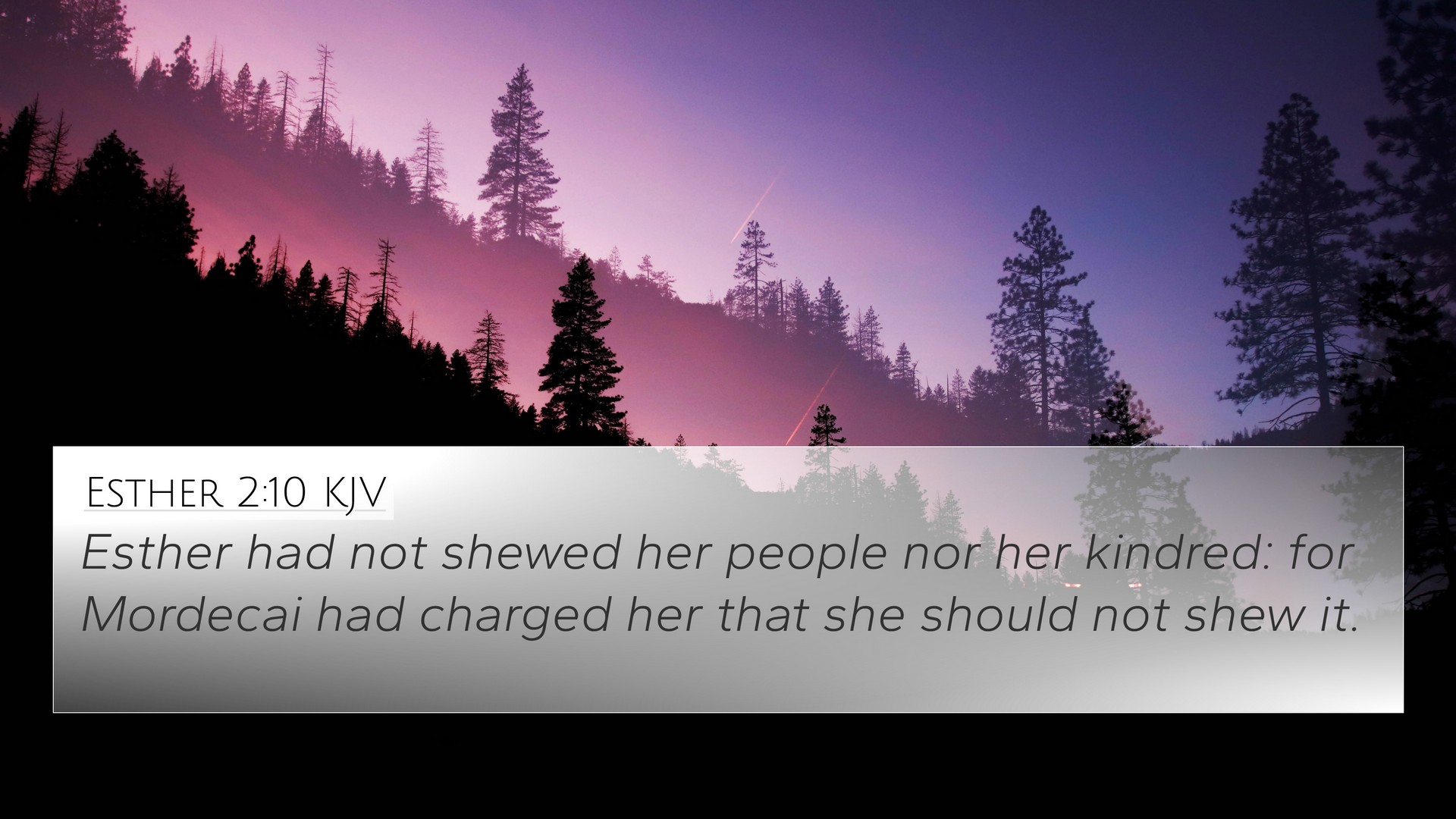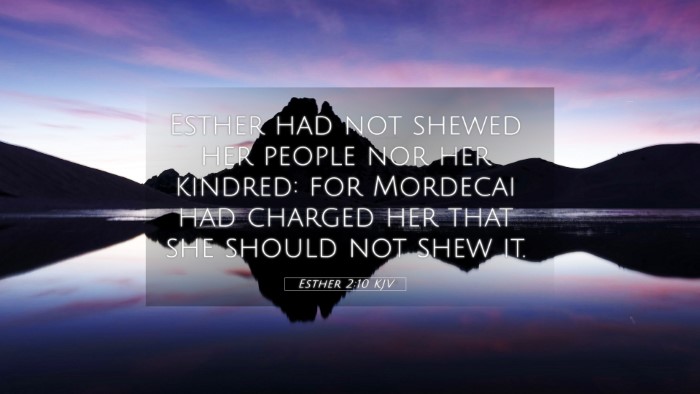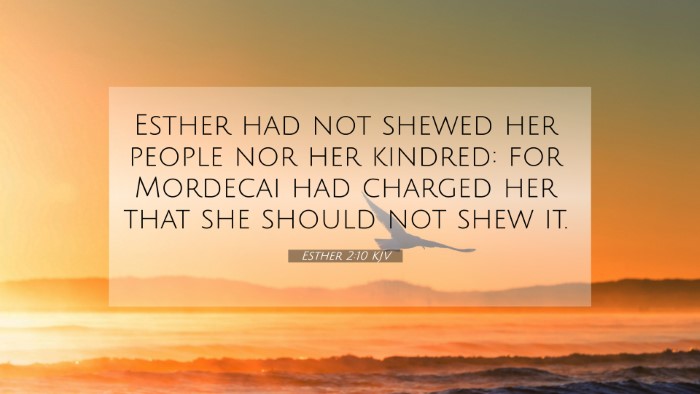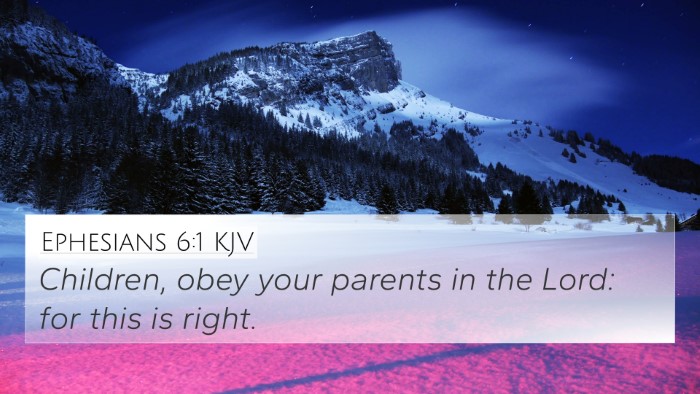Old Testament
Genesis Exodus Leviticus Numbers Deuteronomy Joshua Judges Ruth 1 Samuel 2 Samuel 1 Kings 2 Kings 1 Chronicles 2 Chronicles Ezra Nehemiah Esther Job Psalms Proverbs Ecclesiastes Song of Solomon Isaiah Jeremiah Lamentations Ezekiel Daniel Hosea Joel Amos Obadiah Jonah Micah Nahum Habakkuk Zephaniah Haggai Zechariah MalachiEsther 2:10 Similar Verses
Esther 2:10 Cross References
Esther had not shewed her people nor her kindred: for Mordecai had charged her that she should not shew it.
Uncover the Rich Themes and Topics of This Bible Verse
Listed below are the Bible themes associated with Esther 2:10. We invite you to explore each theme to gain deeper insights into the Scriptures.
Esther 2:10 Cross Reference Verses
This section features a detailed cross-reference designed to enrich your understanding of the Scriptures. Below, you will find carefully selected verses that echo the themes and teachings related to Esther 2:10 KJV. Click on any image to explore detailed analyses of related Bible verses and uncover deeper theological insights.
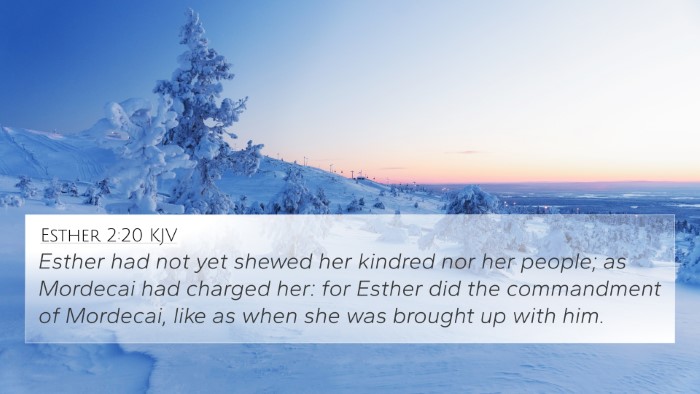
Esther 2:20 (KJV) »
Esther had not yet shewed her kindred nor her people; as Mordecai had charged her: for Esther did the commandment of Mordecai, like as when she was brought up with him.
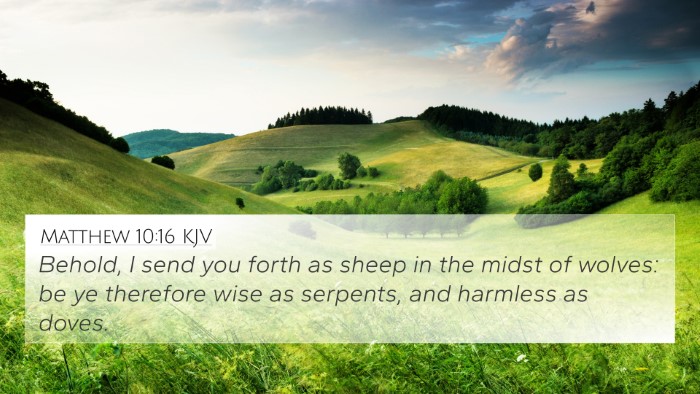
Matthew 10:16 (KJV) »
Behold, I send you forth as sheep in the midst of wolves: be ye therefore wise as serpents, and harmless as doves.
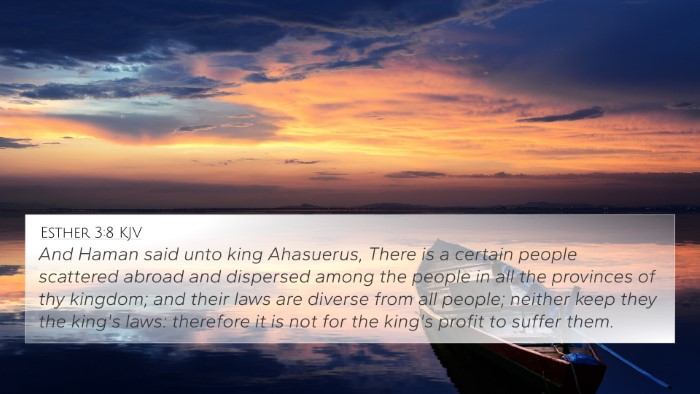
Esther 3:8 (KJV) »
And Haman said unto king Ahasuerus, There is a certain people scattered abroad and dispersed among the people in all the provinces of thy kingdom; and their laws are diverse from all people; neither keep they the king's laws: therefore it is not for the king's profit to suffer them.
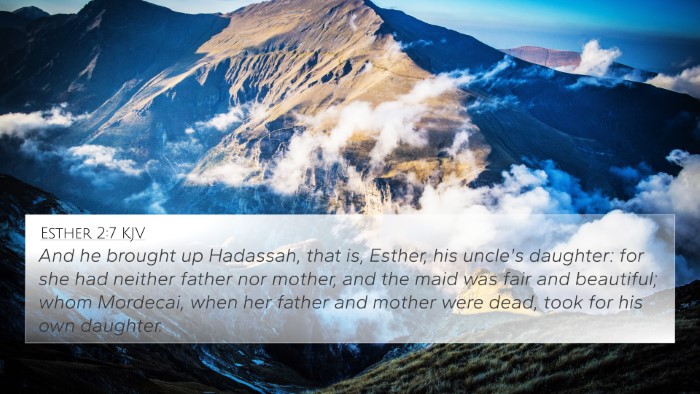
Esther 2:7 (KJV) »
And he brought up Hadassah, that is, Esther, his uncle's daughter: for she had neither father nor mother, and the maid was fair and beautiful; whom Mordecai, when her father and mother were dead, took for his own daughter.
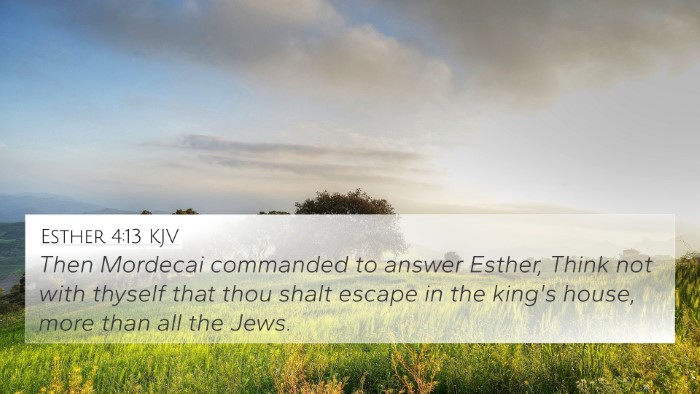
Esther 4:13 (KJV) »
Then Mordecai commanded to answer Esther, Think not with thyself that thou shalt escape in the king's house, more than all the Jews.

Esther 7:4 (KJV) »
For we are sold, I and my people, to be destroyed, to be slain, and to perish. But if we had been sold for bondmen and bondwomen, I had held my tongue, although the enemy could not countervail the king's damage.
Esther 2:10 Verse Analysis and Similar Verses
Esther 2:10 reads: "Esther had not disclosed her people or her kindred, for Mordecai had instructed her not to make them known." This verse from the Book of Esther provides rich insights into the context of Esther's life and her obedience to Mordecai's guidance.
Meaning and Interpretation
In this verse, several layers of meaning emerge, emphasizing the themes of identity, wisdom, and obedience:
- Identity Concealed: Esther's decision not to reveal her Jewish identity highlights the dangers faced by Jews in Persia during this period. This action is fueled by a need for self-preservation and the fear of persecution.
- Parental Guidance: Mordecai's instruction to Esther reflects his protective nature and wisdom. He understood the challenges that Esther would face, and his counsel guides her behavior in a potentially perilous situation.
- Divine Providence: The unfolding events in the Book of Esther suggest a connection to God’s providence. Throughout the narrative, every action has significant implications that align with God's overarching plan for His people.
Connections to Other Bible Verses
Esther 2:10 can be cross-referenced with several other scriptures that deepen the understanding of this verse.
- Esther 3:4: Mordecai's refusal to bow to Haman emphasizes the danger in revealing one's identity.
- Esther 4:14: Mordecai reminds Esther of her unique position and the possibility of divine purpose in her elevation to queen.
- Daniel 1:8: Like Esther, Daniel chose to maintain his identity and values in a foreign land.
- Philippians 3:20: Paul speaks of our citizenship in heaven, paralleling Esther’s hidden identity.
- 1 Peter 2:9: The believers are described as a chosen people, a royal priesthood, underscoring the theme of identity in faith.
- Matthew 10:16: Jesus sends his disciples as sheep among wolves, a theme of wise navigation through present dangers.
- Acts 4:19-20: The Apostles’ determination to speak truth even when threatened mirrors Esther's choosing to act wisely yet boldly.
Thematic Connections
The themes found within Esther 2:10 resonate throughout the Bible, revealing patterns of behavior among God's people:
- Obedience to Authority: Esther's adherence to Mordecai's counsel reflects a broader biblical theme of respect for authority, seen in Romans 13:1.
- Identity and Faith: Many biblical figures, such as Joseph (Genesis 45:4) and Daniel (Daniel 1:8), navigate complex identities while staying true to their faith.
- Guidance from Elders: This theme is prevalent throughout Proverbs, where the wisdom of elders is treated with honor and importance.
Application for Today
Modern believers can draw several lessons from Esther 2:10:
- Courage in Identity: Like Esther, Christians today must navigate their identities in a world that may not share their beliefs.
- Respecting Wise Counsel: Seeking guidance from trusted mentors, much as Esther did with Mordecai, is crucial for making wise decisions.
- Understanding God’s Purpose: Believers are encouraged to see their positions and trials as part of God's providential plan for their lives.
Tools for Bible Cross-Referencing
For deeper understanding and exploration of Biblical texts, consider utilizing the following tools:
- Bible Concordance: Helps in finding verses and themes quickly.
- Bible Reference Resources: Comprehensive guides to help in cross-referencing and study.
- Cross-reference Bible Study: Methods for systematic exploration of scripture connections.
Conclusion
Esther 2:10 serves as a pivotal moment that emphasizes faith, identity, and divine guidance. As believers reflect on this verse, they can find connections throughout Scripture that illuminate the choices they must make in their own lives. By employing tools for Bible cross-referencing, such as concordances and thematic guides, one can uncover the rich layers of biblical truth contained within God's Word.
